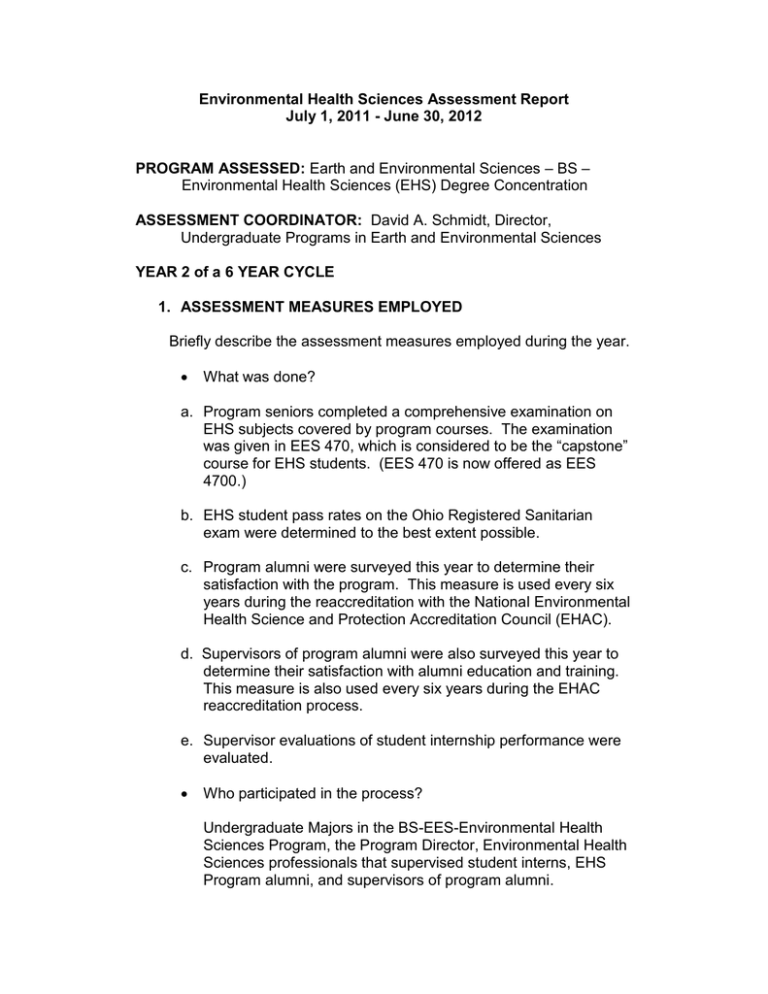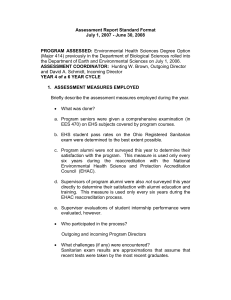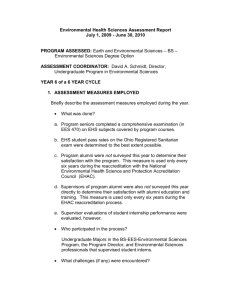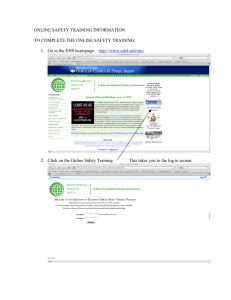Environmental Health Sciences Assessment Report PROGRAM ASSESSED:
advertisement

Environmental Health Sciences Assessment Report July 1, 2011 - June 30, 2012 PROGRAM ASSESSED: Earth and Environmental Sciences – BS – Environmental Health Sciences (EHS) Degree Concentration ASSESSMENT COORDINATOR: David A. Schmidt, Director, Undergraduate Programs in Earth and Environmental Sciences YEAR 2 of a 6 YEAR CYCLE 1. ASSESSMENT MEASURES EMPLOYED Briefly describe the assessment measures employed during the year. What was done? a. Program seniors completed a comprehensive examination on EHS subjects covered by program courses. The examination was given in EES 470, which is considered to be the “capstone” course for EHS students. (EES 470 is now offered as EES 4700.) b. EHS student pass rates on the Ohio Registered Sanitarian exam were determined to the best extent possible. c. Program alumni were surveyed this year to determine their satisfaction with the program. This measure is used every six years during the reaccreditation with the National Environmental Health Science and Protection Accreditation Council (EHAC). d. Supervisors of program alumni were also surveyed this year to determine their satisfaction with alumni education and training. This measure is also used every six years during the EHAC reaccreditation process. e. Supervisor evaluations of student internship performance were evaluated. Who participated in the process? Undergraduate Majors in the BS-EES-Environmental Health Sciences Program, the Program Director, Environmental Health Sciences professionals that supervised student interns, EHS Program alumni, and supervisors of program alumni. What challenges (if any) were encountered? Sanitarian exam results are approximations that assume that recent tests were taken by the most recent graduates. Also, some students completing the comprehensive exam in EES 470 had not completed all the EHS Program courses. 2. ASSESSMENT FINDINGS List the objectives and outcomes assessed during the year and briefly describe the findings for each. OBJECTIVES Students will be well prepared for successful graduate study, either at WSU or elsewhere. Students not electing graduate school will possess the skills to enable them to successfully enter the job market in their chosen specialty (public health, industrial hygiene, worker safety, environmental protection, or natural resource management.) Students will be prepared to respond as knowledgeable civic leaders when issues relating to public health and the environment are discussed. OUTCOMES Students will possess a broad knowledge of the environmental sciences with the necessary skills in mathematics, statistics, chemistry and biology for supporting and integrating into environmental applications. Students will be capable of competently solving on-the-job problems relating to environmental issues. Students will have effective communication skills, both oral and written, for technical, administrative and public arenas. Students will have the ability to be flexible and adaptable to the many changing environmental sub-disciplines they will encounter and perform in a competent manner in each. FINDINGS The findings show that using the measures identified, we have met the program objectives and outcomes: Students possess a broad knowledge of the environmental sciences with the necessary skills in mathematics, statistics, chemistry and biology for supporting and integrating into environmental applications. Students are capable of competently solving on-the-job problems relating to environmental issues. Students have effective communication skills, both oral and written, for technical, administrative and public arenas. Students have the ability to be flexible and adaptable to the many changing environmental sub-disciplines they will encounter and perform in a competent manner in each. More specifically, Internship supervisor comments indicate that EHS students have the scientific knowledge, communication skills, and other competencies that prepare them well for their internship duties. Students during the recent past have achieved similar scores on the EHS comprehensive exam, indicating the program continues to be effective. EHS graduates taking the Ohio Registered Sanitarian exam during 2007-2011 have achieved a 100% pass rate, with all passing on their first attempt. In contrast, the statewide pass rate during recent years has generally been below 50%. Thus, the performance of WSU EHS graduates continues to be impressive. 3. PROGRAM IMPROVEMENTS Previous assessments identified the need for the EHS program to better inform students of the advantages of continued professional involvement and development. The need to emphasize these advantages has – and continues to be – conveyed to all EHS faculty with a request that they share that information with their students. A significant improvement in this area has been the founding of the WSU Student Chapter of the Kitty Hawk Section of the American Society of Safety Engineers, which has facilitated the interaction of EHS program students with area safety professionals. Also, input from EHS faculty was beneficial for tailoring the EHS program to the current semester-based academic calendar. The new program curriculum has been endorsed by EHAC. 4. ASSESSMENT PLAN COMPLIANCE The assessment plan was carried out as intended. 5. NEW ASSESSMENT DEVELOPMENTS No new developments were identified.


